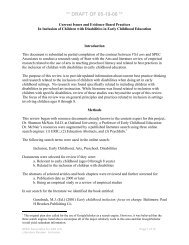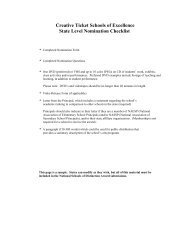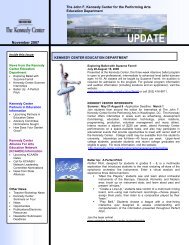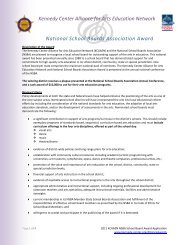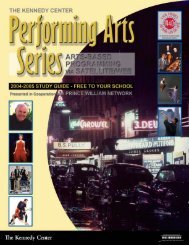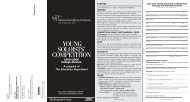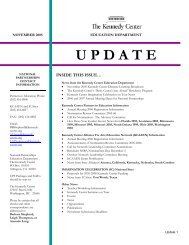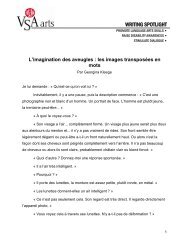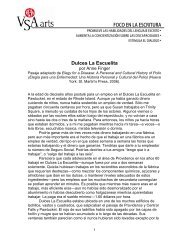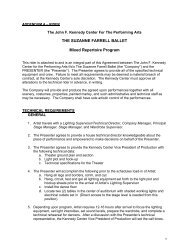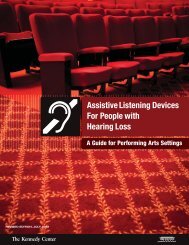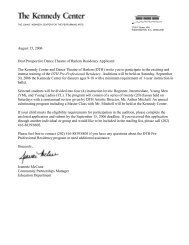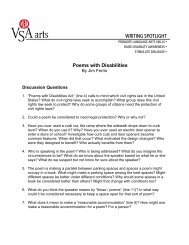Playwright Discovery Award Teacher's Guide - The John F. Kennedy ...
Playwright Discovery Award Teacher's Guide - The John F. Kennedy ...
Playwright Discovery Award Teacher's Guide - The John F. Kennedy ...
You also want an ePaper? Increase the reach of your titles
YUMPU automatically turns print PDFs into web optimized ePapers that Google loves.
Prologue<br />
Welcome to the VSA <strong>Playwright</strong> <strong>Discovery</strong><br />
Resource <strong>Guide</strong>. This publication helps<br />
students prepare submissions for VSA’s<br />
annual <strong>Playwright</strong> <strong>Discovery</strong> <strong>Award</strong> Program, by<br />
introducing students to new ways to consider<br />
disability, playwriting, dramaturgy or editing their<br />
play, presentation, and production. A number of<br />
leading theater practitioners have contributed to<br />
this guide, ensuring a comprehensive and current<br />
exploration of disability and theater.<br />
Many of the exercises were designed to be<br />
completed within a single class period with<br />
minimal follow-up homework. However, the<br />
exercises may be extended if necessary. In<br />
general, most creative portions—writing a scene<br />
or creating character—should be allotted 10–15<br />
minutes; reviewing and creative conversation<br />
should be allotted 2–5 minutes per scene;<br />
rewriting should be allotted 20–25 minutes. That<br />
said, how long it takes to complete the exercise or<br />
activity is not important. What is important is that<br />
the theatrical, writing, dramaturgical, or disability<br />
concept be explored, and the creative thinking<br />
process expanded. Much of the guide may be<br />
used in any order; however, many of the exercises<br />
do build on one another. It is written in a style that<br />
allows you to share each introduction or exercise<br />
directly with your students.<br />
This guide includes a Prologue, five Acts, and an<br />
Epilogue.<br />
<strong>The</strong> Prologue is directed to the teacher.<br />
Act I explores disability within society, and how<br />
people with disability are referred to in language,<br />
and often represented on stage or in the media.<br />
Act II offers exercises that introduce students<br />
to the techniques playwrights use to create<br />
believable characters, exciting scenarios, and<br />
engaging scenes. <strong>The</strong> exercises build to lead<br />
students to incorporate disability issues and<br />
concerns into the characters or scene.<br />
Act III leads students through the rewriting and<br />
editing process so that they can enhance their<br />
work (and that of their classmates) and improve<br />
their collaboration skills. <strong>The</strong> rewrite process—or<br />
shaping what you have so that it’s more like what<br />
you imagined—is often facilitated by a dramaturg.<br />
<strong>The</strong> dramaturgical process gives students the<br />
tools needed to shape any project, be it for<br />
English, Science, or History class.<br />
Act IV provides examples of proper play<br />
presentation.<br />
Act V has an assessment for students to complete<br />
both before and after using the exercises in<br />
the guide. <strong>The</strong> assessment determines their<br />
awareness of disability within the culture and<br />
specific aspects of language arts and theater<br />
terminology.<br />
<strong>The</strong> Epilogue explains how the plays are evaluated<br />
for VSA’s <strong>Playwright</strong> <strong>Discovery</strong> <strong>Award</strong>.<br />
4 PROLOGUE



